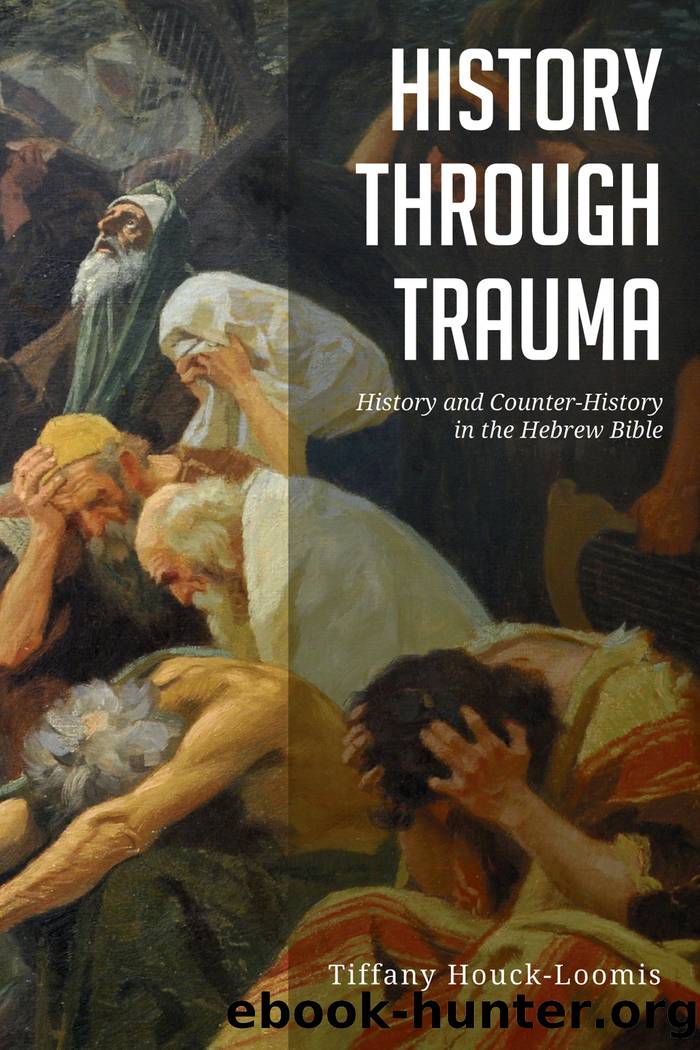History Through Trauma: History and Counter-History in the Hebrew Bible by Tiffany Houck-Loomis

Author:Tiffany Houck-Loomis [Houck-Loomis, Tiffany]
Language: eng
Format: epub
Tags: Religion, Biblical Criticism & Interpretation, Old Testament, Biblical Studies, History & Culture, Psychology of Religion
ISBN: 9781532642111
Google: 6qZaDwAAQBAJ
Publisher: Wipf and Stock Publishers
Published: 2018-04-11T23:46:08.893915+00:00
326. Davoine and Guadilliére, History beyond Trauma, 55.
5
The Book of Job as a Symbolic History
What is there, when there is no meaning? Only nonsense or madness . . . but . . . nothing will deliver you from disorder and meaninglessness, since this is the other half of the world.
âCarl G. Jung327
Following the method proposed throughout this work that uses the psychoanalytic theories of Carl Jung and Donald Winnicott on symbols as a lens through which to analyze the historical and literary nuances of the Deuteronomic Covenant and the book of Job it is necessary to start at the place from which I read Job, methodologically and critically. I will continue articulating the psychoanalytic theoretical background that informs a nuanced read of this text in historical relationship with the Deuteronomic Covenant and the history of Israel formulated throughout the years living in exile. Thus far it has been shown that the dominate historical and ideological bent of the Hebrew canon follows from the instructions and consequences from actions in compliance with or against those instructions laid out in the book of Deuteronomy and expounded upon through Joshuaâ2 Kings. Given the known but perhaps unthought328 of tragedy of a community built upon exile and oppression culminating in the horrific event of the Babylonian Exile and destruction of the Jerusalem temple, ancient Israel can be understood through the lens of what cultural critic Ann Cvetkovich describes as a trauma culture. Cvetkovichâs project in her book, An Archive of Feelings, seeks to âseize authority over trauma discourses from medical and scientific discourse in order to place it back in the hands of those who make culture, as well as to forge new models for how affective life can serve as the foundation for public culture.â329 Cvetkovich deconstructs the medical notion of trauma in an effort to depathologize it and thus allow individuals and communities of trauma to inform national culture rather than be relegated to the clinics, Analystsâ offices or prescribed drugs. As she says, âI am compelled by historical understandings of trauma as a way of describing how we live, and especially how we live affectively . . . This trauma archive offers new approaches to national History and requires acknowledgment of affective experience as a mode of participation in public life,â330 In this way, she sees how trauma âdigs itself in at the level of the everyday, and in the incommensurability of large-scale events and the ongoing material details of experience.â331 Trauma archives, âdemand models that can explain the links between trauma and everyday experience, the intergenerational transmission from past to present, and the cultural memory of trauma as central to the formation of identities and publics,â332 The Book of Job can be read in light of Cvetkovichâs definition of an archive of public culture, a trauma narrative that contains the underside of the dominant history, embodying a new symbolic expression of the history of trauma experienced in exile causing a rupture in the construction of the national narrative as
Download
This site does not store any files on its server. We only index and link to content provided by other sites. Please contact the content providers to delete copyright contents if any and email us, we'll remove relevant links or contents immediately.
Machine Learning at Scale with H2O by Gregory Keys | David Whiting(4314)
Never by Ken Follett(3960)
Fairy Tale by Stephen King(3401)
Reminders of Him: A Novel by Colleen Hoover(3123)
The Man Who Died Twice by Richard Osman(3082)
Will by Will Smith(2924)
It Starts With Us (It Ends with Us #2) by Colleen Hoover(2370)
Rationality by Steven Pinker(2368)
Can't Hurt Me: Master Your Mind and Defy the Odds - Clean Edition by David Goggins(2344)
Friends, Lovers, and the Big Terrible Thing by Matthew Perry(2234)
The Becoming by Nora Roberts(2207)
The Stranger in the Lifeboat by Mitch Albom(2127)
Love on the Brain by Ali Hazelwood(2080)
New Morning Mercies: A Daily Gospel Devotional by Paul David Tripp(1920)
A Short History of War by Jeremy Black(1851)
The Strength In Our Scars by Bianca Sparacino(1847)
HBR's 10 Must Reads 2022 by Harvard Business Review(1847)
A Game of Thrones (The Illustrated Edition) by George R. R. Martin(1751)
Never Finished: Unshackle Your Mind and Win the War Within by David Goggins(1715)
